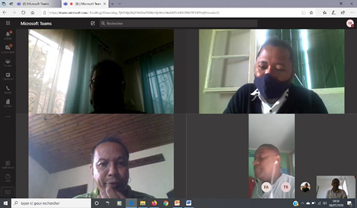Innovation in the Time of COVID: How Remote Capacity Building Will Help Advance Equitable Health-Commodity Supply Chain Distribution in Madagascar’s Social Marketing Sector
Social marketing seeks to address major gaps in access to health commodities. As part of the United States Agency for International Development (USAID)-funded Improving Market Partnerships and Access to Commodities Together (IMPACT) program’s total market approach, social marketing, along with public and commercial sector collaboration, contributes to efforts to attain universal health coverage for all Malagasy people. Specifically, social marketing promotes a community distribution model for health commodities including malaria, family planning, and maternal, newborn, and child health products, reaching communities who otherwise may not receive them. Through the model, regional distribution supervisors (SRDs) distribute products to volunteer district-level agents who in turn distribute to community members and consumers, particularly low- and middle-income families. Across the 13 regions where IMPACT operates, six SRDs, 31 distribution point supervisors (SPDs), 67 district-level volunteers (PARCs), and 887 community-level volunteers (PAs) work together to deliver affordable, accessible health products to the Malagasy population. Their efforts supplement similar distribution schemes in the public sector.
Health commodities distribution, particularly on a volunteer basis, is not without its challenges. A rapid analysis (with SRDs, SPDs, PARCs, and PAs) of influential factors impacting distribution success in May 2020 revealed that at the district and community levels, PARCs and PAs, and especially women PARCs and PAs, face challenges in decision-making around using household financial resources to purchase health commodities. Recognizing an opportunity to address barriers and improve the experience and performance of distributors, IMPACT’s gender and social inclusion (GESI) team, led by Banyan Global, and social marketing distribution team collaborated to integrate GESI concepts into the existing capacity-building curriculum for health commodities distribution agents. This training of trainers is offered to supervisors (SRDs and SPDs) who will in turn share the learning with PARCs and PAs to carry out in their respective areas.

Regional distribution supervisors practice delivering training to PAs and PARCs through a virtual simulation. | Credit: IMPACT
Due to the ongoing COVID-19 pandemic threat, the teams recognized that travel and in-person gatherings were limited, which prompted the development and implementation of an innovative remote-based training series. After the initial curriculum development in French, IMPACT’s gender lead facilitated the first round of training with a small group of six SRDs and three SPDs who validated the content, provided feedback, and offered suggestions for revisions, including incorporating real distribution case scenarios from the different regions. In addition, as the trainers for the upcoming sessions with PARCs and PAs, the SRDs and SPDs played an active role in translating the materials to Malagasy to ensure that the content would be well understood by all participants. They also conducted additional virtual sessions to allow each new trainer the opportunity to practice teaching the content and check their understanding in both languages. The training methodology included sensitization activities on themes related to gender and social inclusion, content and information sharing, small group online discussions, and practical activities. The series focused on addressing challenges related to gender and social inclusion; improving inequities in the community, work, and home spaces; and promoting women’s empowerment.
As of June 30, 2020, two sessions had been conducted with SRDs and select SPDs as part of this innovative co-designed iterative approach, and an additional three sessions were planned for the first month of quarter 4. The sessions have not only strengthened the understanding of gender and social inclusion-related concepts among social marketing distribution team leaders, but their participatory involvement has also influenced their willingness and ability to apply learning across job functions. SRDs and SPDs now better grasp the importance of understanding who their customers are and what products they buy, ordering health products to meet client needs, selling health commodities to all members of the community without stigma or discrimination, and recognizing the impact of gender roles, responsibilities, attitudes, and practices at the household and community levels that influence consumer access to and utilization of products and distribution efforts. In the coming months, the SRD and SPD training team will share their learning with other SPDs before cascading the training out to all 954 PARCs and PAs. The integration of a GESI lens to health commodities distribution promotes a more inclusive and equitable process within the health supply chain, ensuring all segments of the Malagasy population benefit from health products and services that meet their needs.
